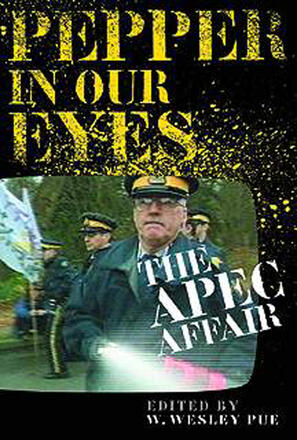
Pepper in Our Eyes
The APEC Affair
La description
In November 1997, the world media converged on Vancouver to cover the
Asia-Pacific Economic Cooperation summit. The major news story that
emerged, however, had little to do with the crisis unfolding in the
Asian economies. At the UBC campus, where the APEC leaders’ meeting
was held, a predictable student protest met with an unusually strong
police response. A crowd of students was pepper-sprayed, along with a
CBC cameraman. The dramatic video footage of the incident that appeared
on the evening news shocked Canadians. The use of noxious chemicals to
attack non-violent protesters somehow seemed un-Canadian. It looked
more like something that police and soldiers in less democratic
countries would do. Other news stories developed. Two dozen law
professors wrote to Prime Minister Chrétien to report that a number of
serious constitutional violations that had taken place on campus. One
protester, held for fourteen hours for displaying a sign saying
“Free Speech,” initiated legal proceedings. Other lawsuits
followed. The RCMP and the government of Canada were named as
defendants, and a public inquiry was launched. A central issue was
whether the Prime Minister’s officials gave orders of a political
nature to the police that resulted in law-abiding citizens being
assaulted and arrested. But why all the fuss? So what if the Prime
Minister gave orders to the police? The contributors to Pepper in Our
Eyes maintain that the “so what” question is of vital
importance. The events at APEC raised serious questions about
constitutional principle, the role of police in a democratic society,
public accountability, and the effects of globalization on rights and
politics. The contributors, experts in a variety of fields, draw upon
their knowledge to explain — in plain English — the background issues
and the values at stake. Some of the authors, such as Gerald Morin,
chair of the first RCMP Public Complaints Commission, and CBC
journalist Terry Milewski, had a direct connection with the APEC
affair. By getting at the fundamental issues behind the APEC affair,
Pepper in Our Eyes seeks to raise our civic consciousness. It shows
that there was much more at stake that day than the questionable use of
pepper spray. The Hughes Report Special Feature
Selected as a BC Book for Everybody
Reviews
This provocative and compelling book blows the lid off Canada’s sorry track record in government and police abuses of power.
- Jim McNulty
A new book Pepper in Our Eyes: The APEC Affair (UBC Press), edited by Wesley Pue, is designed to ensure that those who initially mishandled the security arrangements and, no less important, those who tried to cover up their involvement, face public scrutiny.
- Ian Hunter
The thoughtful, wide-ranging collection of essays . .. is a welcome reminder that police behaviour at APEC ’97 poses fundamental questions that go far beyond the mere matter of who got pepper-sprayed and why. They strike at the heart of our democratic form of government and respect for human rights. .. Pepper in Our Eyes is a valuable addition to the APEC debate.
- Rod Mickleburgh
This is a worthy supplementary text for undergraduate courses in introductory Canadian politics as well as constitutional law . .. This is a worthwhile supplementary text for undergraduate courses in introductory Canadian politics as well as constitutional law.
- Sharon A. Manna